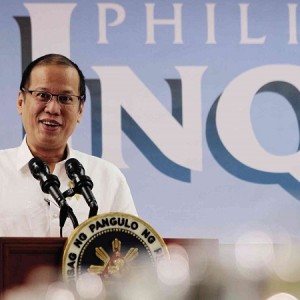PH wants shorter stay for Yanks
MANILA, Philippines—The government is considering a shorter duration for its agreement with the United States on the use of Philippine military bases, compared to the usual 20-year period of similar agreements that the US enters into, the Philippine panel said in a statement on Saturday.
The “substantive issue of duration” is among the provisions in a proposed framework agreement that still needs to be discussed further after the second round of talks held at the US Department of Defense at the Pentagon.
“For the Americans, they typically have agreements like this that have a duration of 20 years. Right now, the Philippine delegation is looking at a much shorter duration,” Foreign Assistant Secretary Carlos Sorreta, panel spokesperson, said in a statement released by the Philippine Embassy in Washington.
Addressing delegates of the Asian News Network (ANN) at the Inquirer on Thursday, President Benigno Aquino III said that the Philippines’ ties with its strategic partners, the US and Japan, “are very robust.”
The Philippines has agreed to allow the US and other allies the use of Philippine military bases in Subic and other parts of the country amid tensions with regional giant China regarding maritime claims.
Article continues after this advertisementSpecific time frames were absent in the agreed upon minutes of the Aug. 29 meeting in Washington, a copy of which the Philippine foreign department released to the press on Saturday with Sorreta’s statement.
Article continues after this advertisementThe key principles discussed included the “understanding” that the US will not establish permanent military bases in the Philippines and the American military’s use of and access to Philippine facilities will be “at the invitation” of the Philippine government.
The Philippine and US panels have agreed that the increased rotation presence of American troops and equipment in Philippine military facilities “will be temporary and comply with the country’s Constitution,” said Philippine chief negotiator Defense Undersecretary Pio Lorenzo Batino in the statement.
Mutual benefit
Batino added that both sides “agreed that joint exercises and activities under a framework agreement will require the approval of the Philippines and will be mutually beneficial to the individual and collective defense capabilities of the two countries in furtherance of Article II of the Mutual Defense Treaty.”
On Friday, US Defense Secretary Chuck Hagel said the United States would not establish permanent military bases in the Philippines, after he paid a courtesy call on President Aquino and met with Defense Secretary Voltaire Gazmin.
Gazmin, however, said that American troops and vessels would be given access to the former naval base in Subic as well as other military facilities in the country.
“Where and what (equipment) can be prepositioned will be subject to prior approval by the Philippine government and based on a mutuality of interest. Any approval will contain specific areas and times for the temporary activity,” Sorreta said in the statement.
The two panels are set to meet again in the US on the second week of September to discuss pending issues, particularly the matter of the agreement’s duration.
The first round of talks was held in Manila on Aug. 14.
The negotiations aim to allow more US troops, ships, aircraft and other equipment to pass through the Philippines, which had hosted tens of thousands of US troops until 1992.
Credible defense
Philippine officials have said an increased US presence was part of Manila’s efforts to build a credible defense posture as it faces territorial disputes at sea with China.
The United States, meanwhile, wants arrangements similar to what it has with Australia and Singapore as it seeks to bolster its ties across Southeast Asia, partly to counter China’s growing military power.
The United States, the Philippines’ former colonial ruler, held on to Clark Air Base and Subic Naval Base in Luzon even after Philippine independence in 1946 but was forced to hand them back in 1992 amid growing anti-US sentiment and a rental dispute.
A new accord in 1999 allowed US troops to return to the Philippines for joint military exercises every year.
Several hundred US Special Forces troops are already on short-term assignments at Philippine bases in the south, where they train and advise local troops fighting Islamic militants. With reports from AFP, Tarra Quismundo
